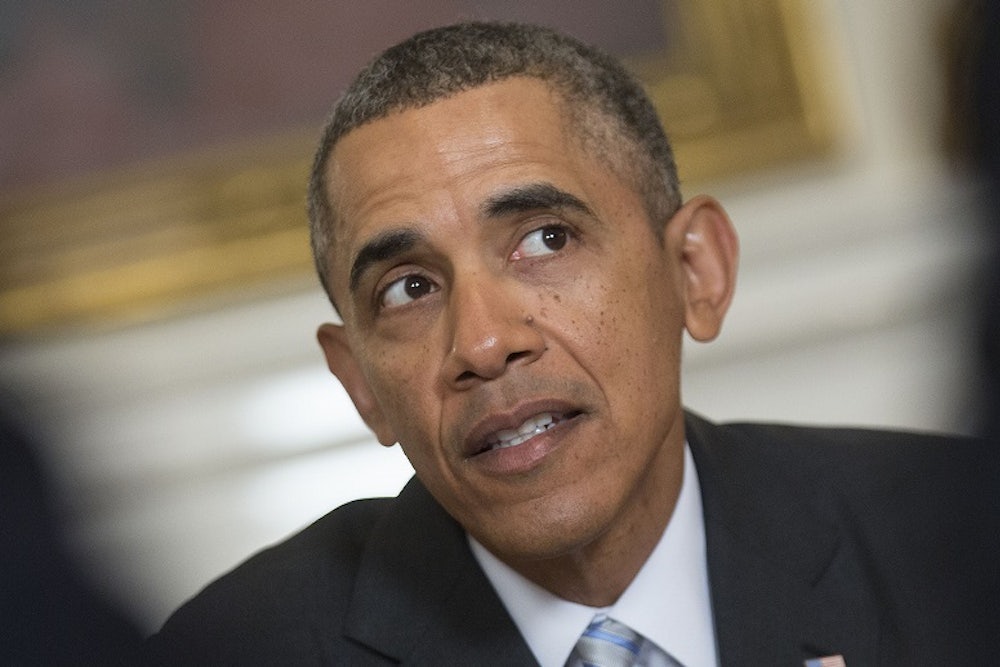There’s a lot to like in the 2015 budget that President Barack Obama released on Tuesday. It would expand the earned income tax credit for childless adults, put billions of dollars towards infrastructure investment (though not as much as he says), and create funding for a universal pre-kindergarten initiative. These are all commendable programs, as is much of what is in the budget. But there is one glaring weakness—not enough help for the long-term unemployed.
The budget does include $4 billion for a public-private partnership, designed to provide the long-term unemployed with job training so that they can rebuild skills that may have deteriorated while they’ve been out of work. It also includes a new "Opportunity, Growth and Security" initiative to invest in critical areas like research, education and public safety. More than 80 percent of the $56 billion that the White House proposes for this initiative would be spent in the first two years and some of it will certainly create new jobs. But given the current rate of long-term unemployment, that's simply not enough. There are other smart ideas targeted at finding the long-term unemployed jobs—ideas that even have a chance at becoming law. The White House could have put them forward.
Why is it so important to focus on the long-term unemployed? Because our remaining unemployment problem is one of long-term unemployment. Short-term unemployment has already returned to its pre-crisis level, as you can see from this graph from the White House's Council of Economic Advisers:

This isn’t surprising. In 2012, Rand Ghayad, a visiting scholar the Boston Fed, and William Dickens, an economics professor at Northeastern University, sent out 4,800 false job applications to 600 employers and varied how long the fictitious applicants had been out of work. They found that people who have been out of work more than six months rarely received a call back from employers, even if they had significant job experience. This was a startling, if somewhat unsurprising finding: employers discriminate against the long-term unemployed.
This is where public policy can help. It can put a finger on the scale to help the long-term unemployed, particularly since short-term unemployment is no longer an issue. As the labor market has begun rebounding, employers have been hiring those out of work less than six months. The ranks of the long-term unemployed have fallen slightly, but it’s unclear whether that’s because they’ve been hired or dropped out of the labor force altogether. Either way, the long-term unemployment rate is still 2.4 percent, well above the pre-crisis average of 1 percent. If we want to help the economy return to full employment, it’s vital that we get the long-term unemployed back to work. The worst case scenario is that these able-bodied workers are permanently lost from the labor force. More and more economists are beginning to worry that this has already happened.
Obama’s public-private partnership will help, but it doesn’t change the incentives of employers. They still will find it easier to discriminate against the long-term unemployed. But there are ways to change that. One such idea is to give employers a financial incentive to hire the long-term unemployed. This could come in the form of a hiring tax credit or, as Republican Senator John Thune has proposed, an employer-side payroll tax holiday. Obama could also offer relocation subsidies to the long-term unemployed so that they can move to areas of low unemployment. Or if he did not want to go those routes, he could have proposed a direct job-creation program like the TANF Emergency Fund that the stimulus created. (That would get a much cooler reaction from Republicans.) Instead, Tuesday was another missed opportunity for President Obama to make such a proposal. Not that Republicans have put forward much to help the long-term unemployed. They haven't. Nevertheless, it's clear that the White House's budget this year is not built around getting Americans back to work, but is instead focused on making long-term investments in the country.
“A lot of our focus in this budget isn't on short-run support for aggregate demand and the types of multipliers you were talking about, but on how to best expand the productive capacity of the economy,” Jason Furman, chair of the White House Council of Economic Advisers, said in response to a question about why the budget includes a mix of middle-class tax cuts and infrastructure investment.
Obama’s budget is filled with smart ideas for expanding “the productive capacity of the economy.” Unfortunately, it comes up short on ideas for getting the economy back to full employment.
